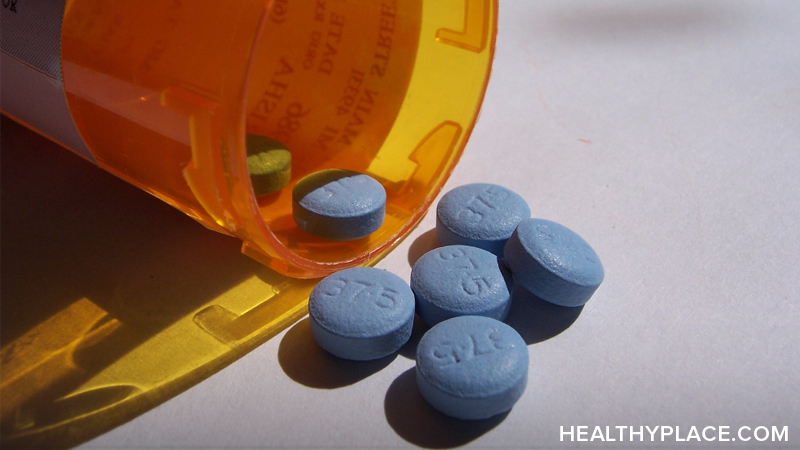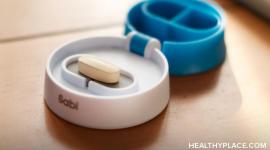Tricyclic Antidepressants: How Tricyclics Work, Side Effects

Before selective serotonin reuptake inhibitors (SSRIs) like fluoxetine (Prozac), tricyclic antidepressants (tricyclics) were the first line of defense against depression. Today, tricyclics are a less popular choice than new generation antidepressants, but they're still important for a subset of people who don't respond to other types of antidepressants. Tricyclic antidepressants (TCAs) are also known as "heterocyclics" or "cyclics."
Common tricyclic antidepressants include:
- Amitriptyline (Elavil, Endep, Levate)
- Amoxapine (Asendin)
- Clomipramine (Anafranil)
- Desipramine (Norpramin, Pertofrane)
- Doxepin (Adapin, Silenor, Sinequan)
- Imipramine (Tofranil, Tofranil-PM)
- Maprotiline (Ludiomil)
- Nortryptyline (Aventyl, Pamelor)
- Protriptyline (Vivactil)
- Trimipramine (Surmontil, Trimip, Tripramine)
You can see a complete list of antidepressants here.
How Tricyclic Antidepressants Work
Tricyclic drugs work by increasing the brain's supply of norepinephrine and serotonin levels - chemicals that are often abnormally low in depressed patients. Unlike some other antidepressants, tricyclics do not act by stimulating the central nervous system or by blocking monoamine oxidase.
However, tricyclic medications interfere with a range of other neurotransmitter systems and a variety of brain cell receptors as well, affecting nerve cell communication all over the brain in the process. This increases the likelihood of side effects. For some people though, tricyclics work better than any other antidepressant drug available.
Who Shouldn't Take Tricyclic Antidepressants?
The first job for your doctor is to decide whether you're one of the people who shouldn't take tricyclic antidepressants. Obviously, your doctor won't prescribe them if you're allergic to this type of antidepressant. If you've taken an MAOI within the past two weeks, you'll want to wait two weeks before taking tricyclics, since the combination of these two can cause serious side effects.
Others who shouldn't take tricyclic medications include:
- If you have any kind of drinking problem
- People with schizophrenia
- People with bipolar disorder
Other conditions that may suggest avoiding certain tricyclics include:
- Bone marrow or blood cell disorders
- Seizures
- Adrenalin-producing tumors
- Serious heart disease
- Glaucoma
How to Use Tricyclics
If your doctor is considering one of the tricyclics to treat your depression, you may be asked to get a physical examination, an electrocardiogram (EKG), and routine blood tests first. These can help determine which type of drug will be safest for you.
If you don't respond to a tricyclic medication, it may mean your dose isn't high enough. Your doctor may order blood tests to find out how much of the tricyclic drug is actually circulating in your blood. If after increasing the tricyclic dose you still feel depressed after four or five weeks, your doctor will probably switch you to a different drug.
Some tricyclic antidepressants may require ongoing blood tests and monitoring.
Tricyclic Overdose
An overdose of a tricyclic antidepressant can be fatal. A tricyclic overdose may cause:
- Hallucinations
- Drowsiness
- Enlarged pupils
- Fever
- Irregular heartbeat
- Severe dizziness
- Severe muscle stiffness or weakness
- Restlessness or agitation
- Breathing problems, respiratory failure
- Vomiting
- Convulsions
- Coma
A TCA overdose can be very dangerous at only 10-15 times your normal dose.
Tricyclic Side Effects
On the whole, tricyclics are pretty safe and effective, falling somewhere between the monoamine oxidase inhibitors (MAOI), which have many side effects, and SSRIs, which have few. Even if you do run into some unpleasant side effects in the beginning of tricyclic treatment, chances are they will become less of a problem as time goes by.
Common side effects with tricyclics may include:
- Headache
- Unpleasant taste
- Sensitivity to sunlight / heat; excessive sweating
- Dry mouth
- Constipation, diarrhea
- Nausea, indigestion
- Fatigue, sedation
- Insomnia
- Weakness
- Anxiety, nervousness
- Weight gain
Some less-common tricyclic side effects include:
- Shakiness
- Dizziness, fainting
- Vomiting
- Abnormal dreams
- Eye pain, dry eyes, visual changes
- Diminished sex drive
- Inflamed tongue
- Jaundice
- Hair loss
- Joint pain, muscle aches, back pain
- Abdominal pain
- Palpitations, irregular heartbeat
- Fever, chills
- Rash
- Hiccups
- Nasal congestion
- Difficult and/or frequent urination
You'll find helpful information about antidepressant side effects and how to manage them here.
Potential Drug Interactions with Tricyclic Antidepressants
Many drugs can interact with tricyclic antidepressants. A doctor should be consulted before taking a prescription or over-the-counter medication. Some drugs that interact with tricyclics include:
- Alcohol
- Amphetamines, ephedrine
- Anesthetics (plus some dental anesthetics)
- Blood pressure medication
- Anticonvulsants
- Antihistamines
- Appetite suppressants
- Tranquilizers (barbiturates, benzodiazepines)
- Blood thinners
- Other psychiatric medication
- Heart medication
- Muscle relaxants
- Sinus medication
Tricyclics While Pregnant or Breastfeeding
Tricyclic antidepressants are considered to possibly risk a fetus or a breastfeeding newborn. If you're pregnant and seriously depressed, you and your doctor will have to weigh the risks of your untreated depression against possible damage to your fetus.
APA Reference
Tracy, N.
(2022, January 4). Tricyclic Antidepressants: How Tricyclics Work, Side Effects, HealthyPlace. Retrieved
on 2026, March 4 from https://www.healthyplace.com/depression/antidepressants/tricyclic-antidepressants-how-tricyclics-work-side-effects



